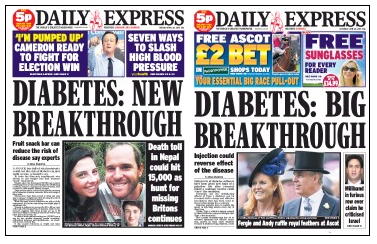After the angst of the referendum and the relentless assault on migrants and refugees, it was something of a relief this morning to see an old favourite dominating the Daily Express front page.
An Oxford University study has concluded that people who take statins to lower their cholesterol may be at a "slightly increased risk" of developing diabetes.
This risk was, however, "greatly outweighed" by the benefits of statins in preventing heart attacks and stroke, according to lead researcher Dr Michael Holmes.
The hypochondriac Express has five big health concerns: dementia, diabetes, arthritis, heart disease and cancer. Statins straddle two of the them - helping to prevent one, while possibly causing another - so the paper is always interested in medical experts' (often contradictory) pronouncements on the drugs.
Today's is the 22nd statins splash from the Express and its Sunday sister since the start of 2014 - and third to say that the drugs cause diabetes. The Sunday is distinctly sceptical about the drugs and has produced ten of those front pages, not only linking them to diabetes, but also to Parkinson's, hundreds of deaths and even saying they can cause the very conditions they are designed to prevent.
The Express is far more positive, hailing their capacity not only to help heart conditions, but also to combat dementia and cancer and prolong life.
Confused? Who wouldn't be? No wonder GP surgeries are struggling to cope, their waiting rooms must be full of Express readers fretting about whether they should continue taking the drugs or give them up.
Or asking for any one of the new miracle cures the Express promises with such regularity.
This morning's lead story, and the paper's return to its health-obsessed status quo after the battle of Europe, inspired a little audit of its medical coverage over the past two and a half years. SubScribe has looked only at causes, prevention and treatment, not at costs, policy or the impact on the health service.
By far the biggest concern for the daily is dementia. Since January 2014, it has splashed on Alzheimer's, memory loss and related conditions 49 times. There have been lifestyle changes to prevent it, new tests to spot it, and new drugs on the way to fight it.
That, indeed, is the pattern for all the paper's pet conditions. Here are the 33 stories about diabetes over the same period (this time with a contribution from the Sunday - but only because of statins):
In third place, we have arthritis - with the Sunday offering one of the 26 pages.
And in joint fourth place, we have heart disease/stroke/high blood pressure (excluding statins stories) and cancer on 21 apiece:
The Sunday, as we have seen, is concerned about heart attacks, but apparently not about cancer:
So what does Dr Express advise readers who wish to avoid these dread diseases?
Well here's a quick rundown of "good" foods:
Chocolate, fatty foods, spicy foods, yoghurt, eggs, rhubarb, bananas, carrots, broccoli, tomatos, mushrooms, grapes, walnuts.
And those to avoid:
Junk food, red meat, bacon, chicken (sometimes).
Drinking wine, tea and coffee is good; drinking fruit juice and fizzy drinks is dangerous.
Whatever you eat, it's best if you don't have too much of it.
Almost anything can be made better by a walk in the sunshine or some gardening - the vitamin D will help to lower your blood pressure and prevent diabetes, and the exercise will beat arthritis, help to ease back pain, counter diabetes and add years to your life.
It's a good idea to keep your brain active, too. By going to work or doing puzzles, for example.
And try to get a good night's sleep - but don't overdo it, because naps are bad for you and too much sleep might kill you. Be especially careful if you need sleeping pills.
Does any of this surprise you? Well it should - because the idea of eating healthy food in moderation and taking exercise is apparently sufficiently unusual for it to make the splash on 99 occasions in just over two and a half years.
Here's the collection of wonder diets:
And here are the dangers:
Of course, the nirvana is to live forever - or at least long enough to enjoy your pension (which is constantly being threatened, but that's another story). There is apparently a pill on the way that will allow us to reach 120, though heaven knows who'd want to.
Anyway, advice on achieving an extended lifespan, including various "easy steps" and "golden rules", has made the lead for the daily 36 times since January 2014 (the Sunday doesn't seem particularly concerned about longevity):
The Express has, as we know, an ageing readership, so its diseases of choice are unsurprising. But it is not averse to mentioning others when there are no breakthroughs in its preferred fields: it has reported on two cures for blindness (yes, only a certain form - but never let that spoil the heading), acknowledged the agony of back pain and migraine (twice each), promised a cure for the common cold and advised that bananas and a honeysuckle drink can fight flu.
And, er, that's it, taking the grand total of medical splashes over the period to 216 - almost double the number on immigrants.
Some duplication was inevitable. First, a reminder of where we started:
Sometimes you can say exactly the same thing using completely different language (sunshine is also good for fighting diabetes):
And here's another example of expressing essentially the same message using different examples:
If you want to convey what is practically the same advice on consecutive days, try offering two sides of the same coin thus:
Sometimes deploying a different combative verb works (chocolate also helps you to live longer):
... or playing with nouns and adjectives:
All hail the multi-taskers:
But sometimes, there's no avoiding that absolute sense of deja vu:
In the course of these 200-plus stories,the Express papers reported on 10 breakthroughs, 20 cures, and 33 "new" treatments (including 15 pills, 8 drugs and 6 jabs), six of which were "on the way".
There were 37 ways to "beat" disease and 29 ways to "fight" it. They dealt with 17 risks and 5 dangers and sought to alleviate 4 agonies and 15 pains.
All in all, the papers - most especially the daily - are showing commendable dedication to keeping their declining readership alive.
So what else can one do but raise a glass of red wine and wish readers the very best of health.

























No comments:
Post a Comment